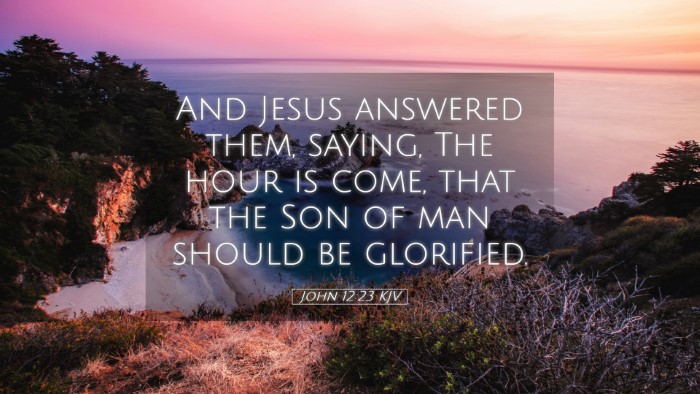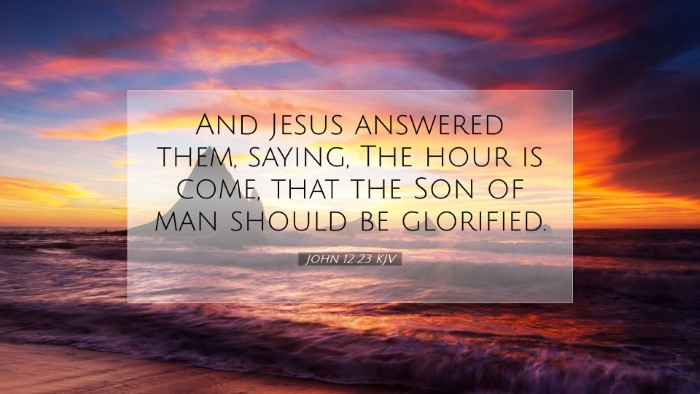Commentary on John 12:23
Verse: "And Jesus answered them, saying, The hour is come, that the Son of man should be glorified."
Contextual Background
John 12:23 falls in a pivotal moment of Jesus' final week before the crucifixion, as He begins to prepare His disciples and the surrounding audience for the significance of His impending sacrifice. The verses preceding this particular statement detail the arrival of Greek seekers who wish to see Jesus, indicating the expanding influence of His ministry beyond the Jewish community. This serves as a prophetic foreshadowing of the Gospel's reach to all nations.
Matthew Henry's Commentary
Matthew Henry emphasizes the significance of "the hour" that Christ speaks of, marking it as the determined time for His glorification through His suffering and death. Henry notes that the notion of glory associated with Jesus may seem paradoxical, for it closely intertwines with humiliation and the pain of the cross.
- Glory through Suffering: Henry posits that true glory in Christ comes not from earthly triumphs but through His sacrificial act. The “hour” represents divine timing—a moment ordained by God, indicating that Jesus’ death and subsequent resurrection are pivotal events leading to His glorification.
- Public Acknowledgment: The context suggests an important transition where Jesus moves from a private ministry to a more public understanding of His mission, acknowledging the forthcoming acknowledgment among the Gentiles, which signifies the universal scope of salvation.
Albert Barnes' Commentary
Albert Barnes expounds upon the implications of Jesus’ statement regarding His glorification. He notes that “glory” refers to His exaltation following the crucifixion, highlighting the nature of Christ’s kingdom and the manner in which believers would come to understand His mission.
- Eschatological Significance: Barnes points out that this event cannot be separated from the eschatological promise. The glorification of Christ is tied to His return and His final victory over sin and death.
- Divine Plan: He elucidates that the phrase indicates a crucial moment in the divine plan for redemption. This "hour" signifies the culmination of Jesus’ earthly ministry, perfectly aligning with prophetic scripture and tying together the theological themes of sacrifice and resurrection.
Adam Clarke's Commentary
Adam Clarke offers a detailed analysis of the term "glorified," suggesting it embodies both His passion and the subsequent exaltation following His resurrection. Clarke perceives this moment as an essential transition, both in the narrative of the gospel and in the broader theological framework.
- Humanity's Relationship with Christ: Clarke asserts that understanding Christ’s glorification requires recognizing the intrinsic connection between His suffering and the salvation of humanity. This glorification is not solely for Christ’s benefit but for the establishment of a new covenant with mankind.
- Spiritual Application: He also encourages believers to look at their own call to glorification through suffering. Clarke suggests that the Christian life mirrors this pattern of glory achieved through trials, with the ultimate hope anchored in the resurrection.
Theological Implications
Scholarly consensus underscores John 12:23 as a pivotal moment that captures the core of Christian theology—glory achieved through the cross. The implications of this verse underscore the transformative power of Christ's death, viewed not merely as an end but as the means to a glorious new beginning.
- Redemptive History: This moment ties into the broader narrative of Scripture, presenting the culminative plan of God in redeeming humanity, affirming the supremacy and sovereignty of Christ.
- Covenantal Fulfillment: The reference to "the hour" signifies an appointed time—emphasizing God’s unchanging promise through the Old Testament, culminating in the new covenant established by Christ’s sacrifice.
Conclusion
The exploration of John 12:23 through the lenses of Matthew Henry, Albert Barnes, and Adam Clarke illuminates this verse as a profound declaration of Christ's mission and identity. For pastors, students, and theologians alike, understanding this verse in its full context enhances our comprehension of the implications of Jesus' death and resurrection, as well as the transformative nature of suffering within the Christian journey. It calls believers to a deeper relationship with Christ—one that recognizes the glory manifested through challenges, ultimately leading to eternal life and fellowship with God.


